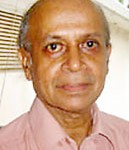ADYAPANA 2014 with LECS, Higher Education Ministry and S. Thomas College
Absence of Private Universities Act stifling Sri Lanka’s progress - govt.
February 19, 2014, 9:31 pm
, The IslandAbsence of Private Universities Act stifling Sri Lanka’s progress - govt.
by Zacki Jabbar
At the ADYAPANA 2014 launch: From left, Senior Manager LECS, Husnie Rauf, General Manager LECS,Aasim Mukthar,
Treasurer
S. Thomas’ College Mount Lavinia Old Boys Association, Shanil
Jayasekara, Warden, S. Thomas’ College, Mt. Lavinia, Prof. Indra de
Soysa, Ministry of Higher Education Secretary Dr. Sunil Jayantha
Navaratne, Managing Director LECS, Arjun Dharmadasa and Mohammed
Isthiquar, Business Development Manager, BCAS Campus - Gold Sponsor.
Sri
Lanka has the potential to become a hub for educational excellence,
but its inability to introduce a Higher Education Act with provision to
regulate private universities was a huge drawback, a senior government
official said.
Higher Education Ministry Secretary Sunil Jayantha Navaratne, addressing the launch of ADYAPANA 2014,
at the Cinnamon Grand last week, lamented that disruptive forces
including the Government Medical Officers’ Association (GMOA) were
preventing the New Higher Education Act which had already been drafted
from becoming law.
Asked how Sri Lanka could
become a hub of educational excellence when the Malabe Private Medical
College (MPMC) was unable to function even many years after it had been
issued a licence, Navaratne replied that initially there had been a
drawback as the college did not have a hospital of its own, but that
had been overcome and it was now ready to offer medical degrees. "The
GMOA has been unreasonably opposing the MPMC. Around 15,000 students go
abroad annually for higher studies. The establishment of private
universities will help save valuable foreign exchange. The Pali
University has been able to attract around 1,000 foreign students. This
shows that if the right environment and necessary laws are in place,
we could become an international hub for educational excellence."
When
pointed out that there were many other organisations apart from the
GMOA which opposed private universities, Navaratne said: "Protests are
to be expected in a democracy, but we will overcome them and establish
more seats of higher learning. The media has a crucial role to play in
changing negative perceptions."
ADYAPANA 2014
organised by the Presidential Award winner Lanka Exhibition and
Conference Services (LECS),in collaboration with the Higher Education
Ministry, is scheduled to be held for the ninth consecutive year from
September 26 to 28 at the BMICH. The S. Thomas College Old Boys’
Association teamed up with the exhibition from last year. The
Batticaloa Edition has been fixed for later this year. ADYAPANA KALVI was conducted in Jaffna last month.
S.
Thomass College Warden Prof. Indra De Soysa said that flexibility was
the key to progress."ADYAPANA with a wide range of courses to offer,
would not only provide the much needed flexibility that school leavers
looked for, but also provide them with career guidance counselling."
Managing
Director of LECS Arjun Dharmadasa said that they were confident of
attracting students from many countries including the Maldives to the
exhibition which would be held immediately after the conclusion of the
GCE A/L. "It provides immediate higher education opportunities. Around
12,000 students visited ADYAPANA last year. There were well over
150 stalls displaying information of various courses, student
programmes, higher education options and job opportunities. Despite the
high level of competition and options available in the field of
education, many students have continuously patronised our fair which
has helped them pursue their visions successfully."
General
Manager of LECS, Asim Mukthar noted that the Exhibition would feature
specific pavilions for visiting universities and special sessions by
top professionals focused on students and their career decisions.
ADYAPANA
has through the years built a reputation of having one of the highest
student turnover rates, he said. This year’s event will comprise many
other attractions focused on the growing student population and provide
the visitors with value additions, he added

